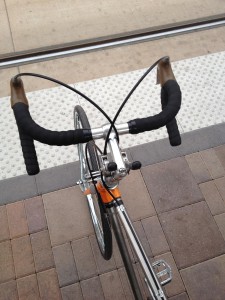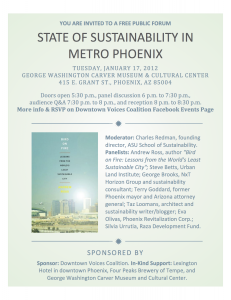…in which I endorse Greg Stanton to be the next Mayor of Phoenix.
As I am sure you have noticed by the endless campaign signs on Phoenix’s streets, there’s a major election on Tuesday, November 8. All Phoenicians will be voting for mayor, and the final two candidates are Greg Stanton, a former city councilman and assistant attorney general, and Wes Gullett, an erstwhile corporate lobbyist.
If you’ve been following my tweets on Twitter or my occasional update on Facebook, you’ll note that I have been emphasizing the importance of getting involved in local issues. Much has been made about the Occupy Wall Street demonstrations that have spawned regional events around the globe, including in our own city. I’m an ardent believer in the belief that true, honest, and sustainable change begins at home.
We want change to happen. We crave change. Other than a very few people, nobody is content with how things are going. And rather than look at things from the big picture and agonize over how we’ll change things (ultimately settling with the status quo), let’s look here. Let’s look at our own Phoenix.
It’s probably redundant to say that Phoenix has fallen behind in many things over the last decade. We have let side conversations drive our political conversations instead of looking at the major issues. If you read The Arizona Republic‘s endorsement of whom they want to be Phoenix’s next mayor, they identified changing the city’s pension system and revising its employees’ benefits package as the two big issues that will face Phoenix in this decade. And while these are important issues, as you and I know, there are far more important issues that need to be not only addressed but tackled by Phoenix’s next mayor.
In its next decade, Phoenix has to address many issues that are far more important than how the city compensates its employees. Our local leaders have to look at how we can move forward far more sustainably. And I mean absolutely more than just installing solar panels on parking shades: I mean looking at supporting things that can and ought to be sustained. We need to look at expanding and enhancing the region’s public transportation, we need to look at making historic preservation a top priority because “the greenest building is the one already standing,” we need to encourage people-friendly pedestrian development, and we need to develop networks for alternative modes of transportation. My list could go on and on.
These issues aren’t conservative issues nor are they liberal issues. Nor is this race about garbage collection, water rates, or permitting processes. The race is about advancing LOCAL issues like thoughtful investments in our local economy, including education, quality jobs, and smart economic development. We want a leader who will advocate for Phoenix first and use the bully pulpit afforded to the Mayor to challenge and to change this state’s regrettable education policies, missed action on advancing clean energy, and reputation in the nation and around the world.
By the City of Phoenix’s own laws, this election is a nonpartisan race. One can argue how the election has turned extremely partisan. One sees signs about whom “taxpayers support” and what sides the public safety employees support. Or one sees which candidates are being supported by political parties and by political action committees.
For me, although endorsements are nice, it’s not about that. At the end of the day, it is about two things: it’s about the candidate who dreams outside of our community’s collective comfort zone and it’s about the candidate who works with all sides and builds consensus.
If our civic leaders didn’t dream outside of our own collective comfort zone, we would never have seen a strong bioscience presence in downtown or not one but three vibrant colleges and universities in the heart of our city (four of the constituent colleges of Arizona State University, the University of Arizona College of Medicine, and the Phoenix School of Law). If we just looked at numbers, Phoenix would never have blossomed into the city that it is. If we just looked at numbers, there would be no reason to save this city’s history or to build a strong downtown and midtown core. And certainly, if we just looked at numbers, we would never have seen METRO light rail, whose ridership numbers continue setting records.
Also, it is about supporting the candidate who will build consensus and support in the community. It’s about the candidate who will bring all sides to the table in issues like the city budget or how to deal with unions, not just attack them and disenfranchise them because it’s politically expedient to do so.
The candidate that will build consensus in Phoenix, bring all sides to the discussion, and lead Phoenix forward by dreaming outside of our collective comfort zone is Greg Stanton. I encourage you to join me for voting for Mr. Stanton and making Phoenix’s next decade its best decade. Mail-in ballots have been mailed out and voting ends on November 8. For more information, check the City of Phoenix’s Elections website.



 PHOENIX, Arizona – A panel of local experts and Andrew Ross, author of “Bird on Fire: Lessons from the World’s Least Sustainable City,” will discuss the current state of sustainability in metropolitan Phoenix at a public forum on Tuesday, January 17, 2012. The event, free to the public, will be held at the George Washington Carver Museum & Cultural Center at 415 E. Grant Street. Doors open at 5:30 p.m., panel discussion 6 p.m. to 7:30 p.m., audience Q&A 7:30 p.m. to 8 p.m., and reception with complimentary refreshments 8 p.m. to 8:30 p.m.
PHOENIX, Arizona – A panel of local experts and Andrew Ross, author of “Bird on Fire: Lessons from the World’s Least Sustainable City,” will discuss the current state of sustainability in metropolitan Phoenix at a public forum on Tuesday, January 17, 2012. The event, free to the public, will be held at the George Washington Carver Museum & Cultural Center at 415 E. Grant Street. Doors open at 5:30 p.m., panel discussion 6 p.m. to 7:30 p.m., audience Q&A 7:30 p.m. to 8 p.m., and reception with complimentary refreshments 8 p.m. to 8:30 p.m.